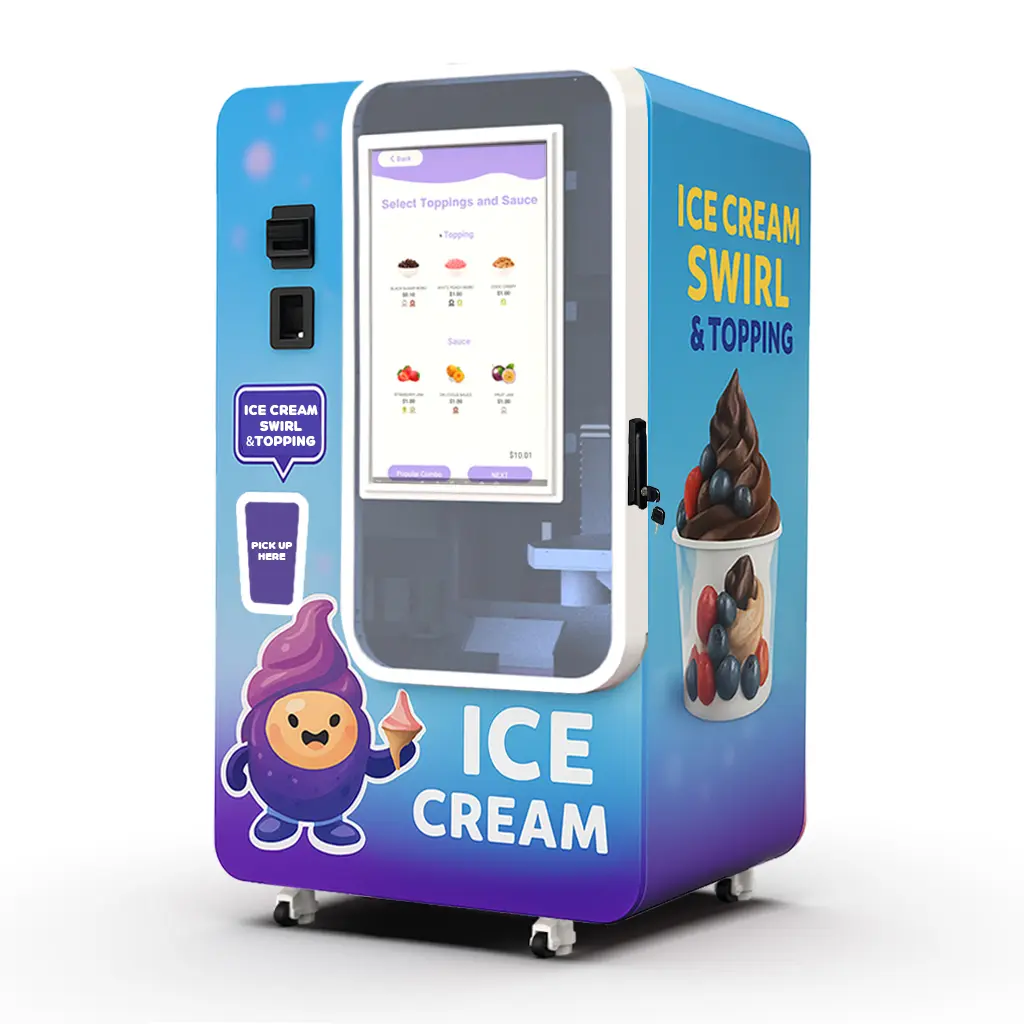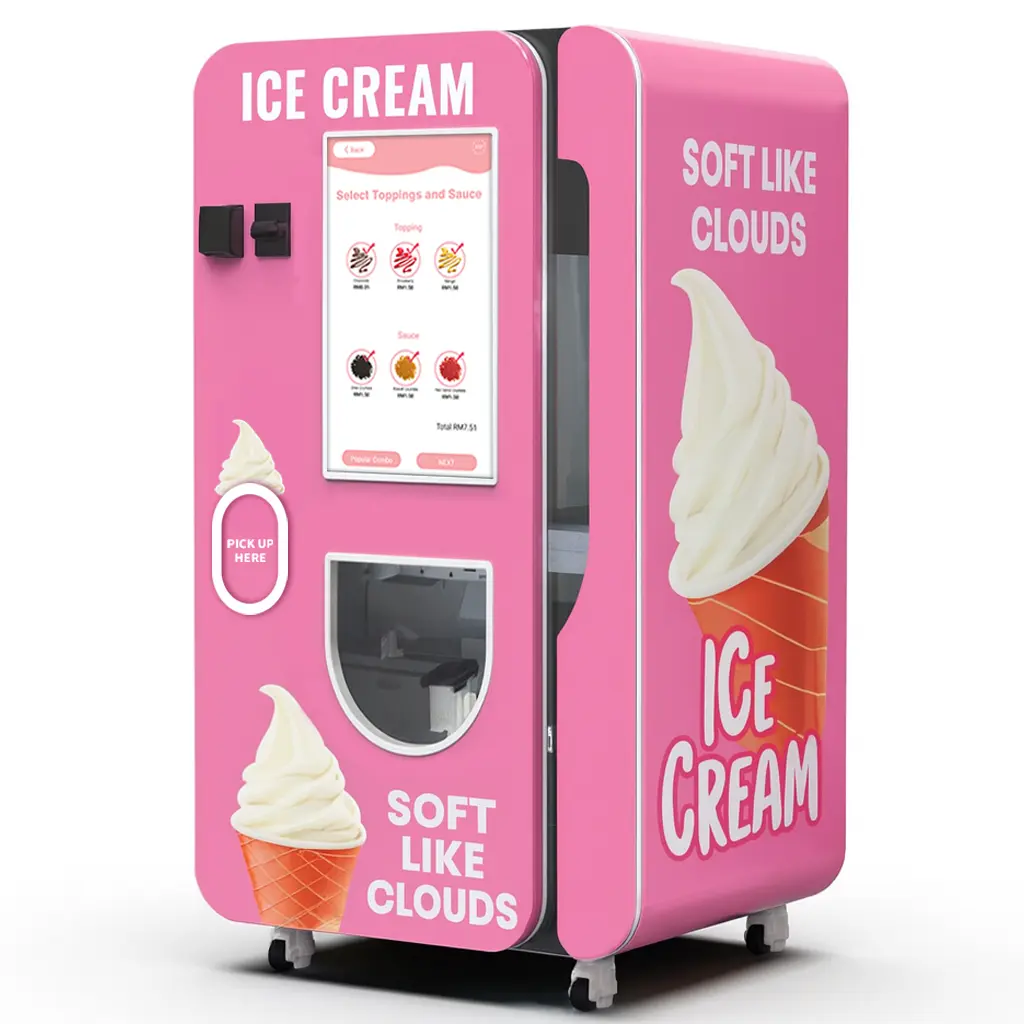Where to Buy Reliable Automatic Ice Cream Vending Machines | The Ultimate Supplier Guide
Choosing a reliable supplier is more critical than selecting the machine itself. Your partner must have a proven global track record, strong in-house R&D capabilities, and essential U.S. certifications like NSF and UL/ETL. Focus on the Total Cost of Ownership, not just the initial price. Thoroughly vet suppliers by asking detailed questions about components, warranty, and support. Avoid red flags like vague certifications and unrealistically low prices. This due diligence ensures a profitable, long-term partnership.

Introduction: Why Your Supplier Choice is More Critical Than the Machine Itself
Investing in an automatic ice cream vending machine in the U.S. means more than just purchasing a piece of hardware; you're entering a long-term partnership. A reliable supplier provides continuous technical support, stable part supplies, and invaluable operational expertise, ensuring your business runs smoothly 24/7. Conversely, a poor supplier, even with the lowest price, can lead to endless downtime, costly repairs, and missed sales opportunities. This guide will teach you how to identify the most trustworthy partner like an expert.
The Four Core Pillars of a Reliable Supplier
Proven Track Record & Global Experience
Don't just listen to marketing claims; demand verifiable evidence. An excellent supplier should have:
- Significant Operational History: Look for suppliers with at least 5-10 years of industry experience.
- Successful Global Deployment: Ask which countries their equipment has been exported to.
- Real Customer Cases & Repurchase Rate: Request to see overseas customer case studies, ideally within your target region.
Technical Expertise & In-House R&D Capability
The core difference between a true manufacturer and a trader is R&D and iteration capability.
- Patents & Core Technology: Inquire about their technical patents.
- Iteration History: Ask how many generations the product has undergone.
- Core Component Sourcing: Request the brands of core components.
Comprehensive Certifications & Compliance
Certifications are your "passport" to smoothly entering the market and avoiding legal risks. For the U.S. market, you must focus on:
- Food Safety Certification: ETL/ANSI certification is the gold standard for food contact material safety.
- Electrical Safety Certification: UL or ETL listing is a mandatory or de facto requirement.
- Other Key Certifications: CE (EU), RoHS (environmental), and others.

Transparent Pricing & Total Cost of Ownership (TCO)
The lowest quote can mean the highest long-term cost. Look beyond the initial price to the Total Cost of Ownership.
- Energy Efficiency: Ask about daily power consumption.
- Maintenance Costs: Inquire about part commonality and pricing.
- Warranty Policy: Scrutinize the warranty terms.
Step-by-Step Evaluation: Your Supplier Vetting Checklist
Initial Screening: Website, Product Portfolio & Online Presence
First, research their official website and social media. A professional manufacturer typically has:
- A detailed product center with downloadable technical specifications.
- Videos or images showcasing the factory, production lines, and R&D team.
- A content-rich blog or knowledge center sharing industry knowledge, not just sales pitches.
- Active social media accounts that engage with customers.
The In-Depth Questionnaire: 10 Crucial Questions to Ask
When communicating with a sales rep, be sure to ask:
- What is the specific brand and country of origin for the compressor?
- Which certifications applicable to the U.S. market has the machine obtained? (Please provide certificate numbers)
- What does the warranty policy specifically cover? What is excluded?
- What functionalities are included in the remote management system? Is there an annual fee?
- What local technical support or part distribution is available in the U.S.? What is the response time?
- Can you provide a reference from an existing client in North America?
- What is the Minimum Order Quantity (MOQ)? Do you support sample orders?
- What are the payment terms and delivery terms (Incoterms)?
- Does the machine support customization (appearance, payment methods, language)?
- What is the typical lead time for manufacturing and shipping by sea to the U.S. West Coast?
Requesting and Verifying References: The Power of Social Proof
Directly ask the supplier for testimonials or contact information from their international clients, especially U.S.-based ones. A satisfied customer willing to share their experience is the most powerful endorsement of a supplier's strength.
Navigating the Sourcing Landscape: Alibaba, Direct Manufacturers, and Local Distributors
Pros and Cons of Sourcing via B2B Platforms like Alibaba
| Pros | Cons |
|---|---|
| Many choices, easy price comparison, some platforms offer trade assurance. | Making it hard to distinguish real manufacturers from trading companies,Communication might be less direct and in-depth. |
Advice: Use the platform as a tool for discovering suppliers, but always move the conversation offline for deep communication and verification.
The Benefits and Process of Working Directly with a Manufacturer
Pros:
- Price Advantage: Eliminate middlemen, obtaining more competitive factory prices.
- Deep Customization: Communicate directly with the engineering team for deep customization of appearance, hardware, and software.
- Technical Support: Get first-hand technical information and training.
- Quality Control: Opportunity to tour the factory (or via virtual live tour) and witness production quality firsthand.
When Does a Local Distributor Make Sense?
If you prioritize immediate local support, a well-established local distributor is ideal.
Pros: Provide quick on-site technical support, local part inventory, more convenient communication, and localized service.
Considerations: Confirm they are an officially authorized distributor and understand their markup structure and service scope.
Red Flags and Deal Breakers: How to Spot an Unreliable Supplier
- Vague Certification Info: Unable to provide clear certification documents or certificate numbers that can't be verified.
- Extremely Low Prices: If the price is unrealistically low, it almost certainly means cuts have been made in materials, craftsmanship, or service.
- Unclear Warranty Terms: Warranty coverage is described ambiguously, or many faults are conveniently classified as "user damage."
- Lack of Communication Transparency: Avoids answering your detailed questions or responds slowly and unprofessionally.
- Unable to Provide Customer References: Refuses to provide any customer cases using "confidentiality agreements" as a reason.
Conclusion: Making an Informed and Confident Purchase Decision
Buying an automatic ice cream vending machine is a significant business decision. By following this guide, you've traetlormed from a passive information receiver into an active expert evaluator. Remember, the most reliable choice is the supplier that can transparently answer all your pointed questions, provide verifiable success evidence, and demonstrate the sincerity to be your long-term business partner. Investing time in due diligence will pay off in long-term peace of mind and considerable returns.
Frequently Asked Questions (FAQs)
Q: What is the typical lead time for manufacturing and shipping from China to the U.S.?
A: This depends on order quantity. Typically, producing a sample unit takes 2-3 weeks. Mass production requires a longer scheduling period. Sea shipping to main U.S. West Coast ports usually takes 25-35 days. Always confirm the specific production schedule and sailing dates with the supplier.
Q: Can I request a fully custom design for the machine's exterior?
A: Yes, reliable manufacturers typically support OEM/ODM. For example, Huaxin Technology offers various customization options from machine decals and light boxes to magnetic panels, even supporting deep外观 (appearance) design for bulk orders. Customization usually has a Minimum Order Quantity (MOQ) requirement.
Q: What does a standard warranty include, and what is considered normal wear and tear?
A: A standard warranty typically covers defects in materials and workmanship. Core components like compressors, motors, and PCBs are usually covered. Normal wear and tear typically refers to consumables that need regular replacement, like seals, belts, etc. Always get warranty details confirmed in writing before ordering.
Q: When shipping from overseas, how do I handle customs clearance and pay import duties?
A: Most Chinese suppliers use FOB or CIF Incoterms. You will typically need to:
- Appoint a customs broker in the U.S. to handle clearance paperwork.
- Pay U.S. import duties (rate can be checked using the HTS code, typically around ...% for ice cream machines).
- Arrange inland transportation from the port to your warehouse.
A reliable supplier will assist by providing all necessary clearance documents (commercial invoice, packing list, certificate of origin, etc.).




